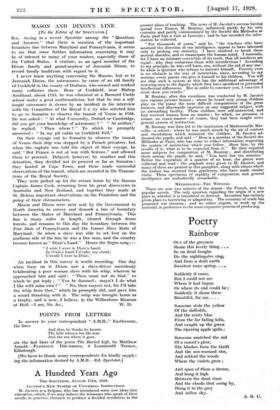A Hundred Years Ago THE SPECTATOR, AUGUST 15TH, 1829.
JACOTOT'S NEW SYSTEM OF UNIVERSAL INSTRUCTION.
M. Jacotot is a Belgian, who has introduced some new ideas into education, which, if we may believe the witnesses who speak of their results in practice, threaten to produce a decided revolution in the present plans of teaching. The news of M. Jacotot's success having spread over France, M. Boutmy, influenced partly by his own curiosity and partly commissioned by the Societe des Methodes at Paris, paid him a visit at Louvain ; and he has recorded the infor- mation he collected.
" For thousands of years," said he, " the teachers who have assumed the direction of our intelligence, appear to have laboured only to prolong our minority. I have resolved to break these ancient shackles, and to emancipate the human mind. I maintain, for I have an intimate conviction of its truth, that all intellects are equal : why then embarrass them with interdictions ? According to my principle, he who will learn, can, without the aid of any one : he alone is ignorant who refuses to instruct himself. Poverty even is no obstacle in the way of instruction, since, according to my notions, every parent can give it himself to his children. You will see that such a system as this has the additional advantage of restoring men to the dignity which they have sacrificed to pretended intellectual differences. But in order to convince you, I conceive I must show you results."
M. Boutmy, after this exordium, was conducted by M. Jacotot into various private houses ; where he heard very young children play on the piano the most difficult compositions of the great masters, and afterwards improvise on any suggested subject, with an astonishing facility. These children were self-instructed, and had received lessons from no master ; by which, we presume, is meant, no music-master—of course, they had been taught some- general system of instruction.
M. Boutmy was then led to the institution of Mademoiselle Mar- cellis—a school ; where he was much struck by the air of content and cheerfulness which animated the children. M. Jacotot ad- dressed the pupils, and said—" Here is a member of the Societe des Methodes at Paris, who has come to collect information respecting the system of instruction which you follow. Show him, by the results of it, what is to be expected from it." He then required some subjects for composition of M. Boutmy ; and distributing them among the pupils, he said, " You have but ten minutes. Before the expiration of a quarter of an hour, the pieces were collected and read : the originals were given to M. Jacotot, and many of them are printed in this pamphlet, along with others which the author has received from gentlemen who have made similar visits. These specimens of rapidity of composition and general intelligence are undoubtedly remarkable.
MELODRAMAS-THE WITNESS.
There are now two sources of the drama—the French, and the popular novels. The only question regarding the origin of a new piece is, whether it is translated or derived. Invention has entirely given place to borrowing or adaptation. The economy of trade has possessed our theatres ; and we either import, or work up the material, in preference to the more expensive process of producing.
































 Previous page
Previous page